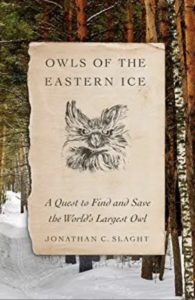Review — OWLS OF THE EASTERN ICE by Jonathan C. Slaught (Russia)
 Owls of the Eastern Ice: A Quest to Find and Save the World’s Largest Owl
Owls of the Eastern Ice: A Quest to Find and Save the World’s Largest Owl
Ny Jonathan Slaght (Russia 1999—02)
Ferrar, Straus and Giroux
August 2020
358 pages
$28.00 (Hardcover)
Reviewed by: John C. Rude (Ethiopia 1962-64)
•
This haunting memoir by a former Peace Corps volunteer is not about his Peace Corps experience. Rather, it is a book that explores the mind and heart of the wilderness that could have come from the pen of Jack London, had the author lived a century later and been a volunteer. This tale of a young American traveling in eastern Russia resembles “Call of the Wild” in its sensitivity to the powerful forces of nature, and its passion for human survival. Yet the author’s modern story chronicles the efforts to save a non-human species — the elusive Blakiston’s fish owl — from extinction.
No one is better equipped to tell this story in English than Jonathan Slaght. Accompanying his father to Russia’s far east when he was nineteen, Slaght fell deeply in love with Primorye, a vast, forested region that borders North Korea and the Sea of Japan. The force of his attraction can be measured by his return to Primorye as an undergraduate, his volunteering to serve there for three years in the Peace Corps, followed by numerous return visits as a University of Minnesota graduate student and conservation biologist. Along the way, Slaght naturally becomes fluent in Russian and attuned to the rhythms of a frontier culture that rarely shows up in the news. When did you last read about or see footage from Vladivostok? Smaller towns like Samarga or Agzu (whose name translates as “Hell”) are described in harrowing detail as Slaght and his Russian collaborators struggle with the logistics of saving an endangered species.
Those unfamiliar with birds and their habitats (as I am) might reasonably ask why it’s worth the effort to read about fish owls, let alone save them? After being drawn in by the author’s compelling, energetic prose, I emerged with a three-fold answer. First, you will experience the thrill of speeding over fragile ice in a heavy snowmobile, or trudging through thick pine forests on skis, just to catch glimpses of the owl’s fleeting presence. Second, you will be amused and amazed by the big bird itself, described in shorthand as a small bear with a six-foot wingspan. Finally, you will travel with the author and his companions on an emotional roller-coaster from hope, to failure, to intrigue, to monotony seasoned with bone-crushing frustration, to renewed faith and professional pride.
Can the fish owl recover its hard-won forest niche, despite the relentless march of human “progress”? It took Jon Slaght four years of field research in Primoye, plus a year of data analysis summarized in his Ph.D. dissertation, to arrive at a tentative answer. Comparing GPS readings of the owl’s flight patterns with maps of human land use, Slaght discovered that only 19 percent of the fish owl’s habitat is currently protected. Nearly half of the best habitat is already leased to logging companies. The most immediate threat to the owls is not logging, but roads. The logs have no value until they can be removed and brought to market. The pressure on the owls is slow, yet inexorable. The outcome, however, is not inevitable. A portion of the world’s remaining 2,000 Blakiston fish owls can and will be saved.
Conservationists may have over-used the “canary-in-a-coal-mine” metaphor, but there are simply too many endangered species, near and far, to ignore. With fires, floods and hurricanes increasing in America year after year, how soon will we be adding humans to the endangered species list? It might require the reading of many more insightful, readable narratives like “Owls of the Eastern Ice” to chart a path for our own survival.
•
John Rude, now retired in Carmel, CA, served in Ethiopia (Eritrea) from 1962 to 1964. He was a college administrator for 40 years. During the past decade he taught English at East Los Angeles College. Now serving on the board of the Museum of the Peace Corps Experience, he has written for national publications and published CSI Your Home, a book on energy conservation.
John Rude is absolutely right: this is a terrific book which teaches us nearly as much about Russia as it does the endangered fish owl. And it’s an outdoor adventure tale. I read the whole thing in a couple sittings. Very compelling. Buy it!